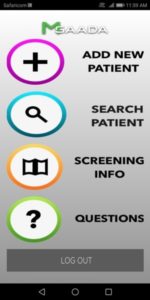 Fieldwork is all about learning, and sometimes that means learning things the hard way. My summer in Kenya taught me a lot about app development, about the process of global health research, and, of course, about myself. My apologies to those of you who have been following the student pieces throughout the summer, but I’ll give a quick summary of my thesis project for first time readers:
Fieldwork is all about learning, and sometimes that means learning things the hard way. My summer in Kenya taught me a lot about app development, about the process of global health research, and, of course, about myself. My apologies to those of you who have been following the student pieces throughout the summer, but I’ll give a quick summary of my thesis project for first time readers:
mSaada is a mobile phone application intended for use by community health volunteers (CHVs) during cervical cancer screening in Western Kenya. The app has multiple features including patient education and counseling materials, protocol support for CHVs, and patient data collection capabilities, to name a few. We hope the app will increase patient understanding of HPV and cervical cancer and act as an efficient and effective resource for CHVs throughout the screening process, leading to greater uptake of cervical cancer screening and treatment services and ultimately improved health outcomes for Kenyan women. Since the app was recently developed and has not yet been tested within Kenyan health facilities, the goal of my thesis work was (*is) to lead a 3-month pilot test and elicit quantitative and qualitative feedback from CHVs regarding the app’s usability and acceptability.
While you may go into the field with a clear plan, a set of goals, or highly ambitious expectations, flexibility and adaptability are key. During my time in Kenya, I learned this lesson through IRB delays. Given the finite amount of time I had in the field combined with the delays we experienced in IRB approval, we were forced to adjust and find a way to make the most of our time in Kisumu. After consulting with my mentor, Dr. Megan Huchko, and quickly reviewing the literature, I decided to pivot from my original plan and conduct iterative feedback sessions with key stakeholders to gain insight into the strengths and weaknesses of the mSaada platform.
These feedback sessions, six in total with four stakeholders each, resulted in a long (emphasis on long) list of suggestions and recommendations about how to improve the app. This feedback ranged from the translation of app content into local languages to the addition of more educational materials tailored to the community to a complete overhaul of the user interface. While the integration of this feedback has further delayed the start of the originally planned pilot study, it should lead to a much-improved app compared to the beginning of the summer.
Once all of the necessary changes have been made, the study team will work to rapidly conduct quality assurance and any necessary troubleshooting prior to deployment within the three pilot facilities. After this, study participants will be refreshed on the main features of the application and will begin use, hopefully within the next month.
Fieldwork was quite an involved process and required lots of patience and determination. I learned how to be more self-reflective, how to respond when things don’t as planned, and how to work collaboratively within a team-based setting. I was able to see firsthand some of the challenges of implementation science and learned a tremendous amount about the hurdles often encountered in the research process. I have a much stronger appreciation for the collaborative nature of global health and was able to make a few friends along the way.
My biggest takeaway from the experience was that global health research is, and should be, a collaborative, interdisciplinary, ‘all hands-on deck’ endeavor. You can’t do it alone. You have to learn to be okay with relying on and trusting others.
Rarely (likely never) is research a straight line between point A and point B. It’s iterative. It’s cyclical. It’s a long, continuous process. Being thrown into it may be stressful, but there’s no better way to learn.
